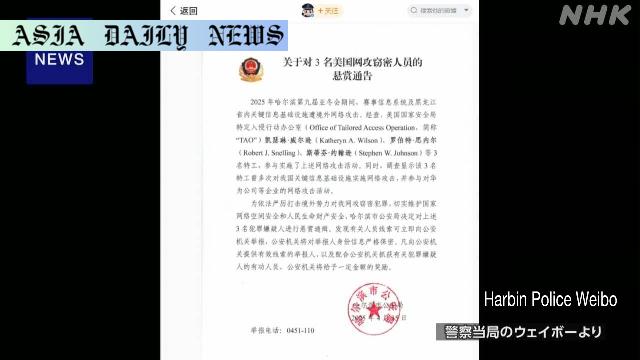Cyberattacks: Chinese police accuse three US NSA agents of targeting the Asian Winter Games and critical infrastructure facilities.

Chinese Allegations: NSA Cyberattacks Targeting Critical Infrastructure
Chinese authorities have made startling accusations against three agents of the United States National Security Agency (NSA), alleging that they conducted a series of cyberattacks. These attacks supposedly targeted critical infrastructure facilities, including those associated with the Asian Winter Games held in Harbin in February. The Harbin Police, through the state-run Xinhua News Agency, revealed the names of the alleged perpetrators, marking an unusual and assertive move by the typically reserved Chinese government.
According to their reports, the hacking unit under the NSA carried out these cyberattacks specifically aiming at facilities within the energy and infrastructure sectors. This move, Beijing claims, was orchestrated to instigate social disorder and siphon off sensitive and confidential information in strategic areas. What makes this accusation more alarming is the alleged involvement of prominent academic institutions like the University of California and Virginia Tech. By including these universities, China insinuates that the attacks were systematic and jointly implemented with various U.S. entities.
Escalating Geopolitical Tensions Amid Cyberspace Allegations
The backdrop of this cyber dispute lies in the broader spectrum of rising geopolitical strains between the United States and China. Both nations have historically accused each other of cyberespionage, often presenting evidence or retaliatory measures to showcase their claims. However, this incident, accompanied by the public naming of alleged NSA operatives, heightens tensions to a new level. It signals China’s readiness to directly confront the United States on platforms traditionally handled through covert diplomacy or opaque narratives.
China has emphasized the malicious intent behind these cyber intrusions, arguing that the actions aimed to destabilize not only infrastructural projects but also the social fabric of targeted regions. Additionally, the timing coincides with the ongoing trade and tech wars, which have put both nations in continual conflict.
Implications for International Cooperation in Cyberspace
This situation underscores the challenges of fostering international cooperation amidst growing cyber-associated hostilities. The global reliance on digital systems makes such incidents more significant than ever, emphasizing the vulnerabilities nations face in protecting their infrastructures and economies. While China and the U.S. cooperate on select matters, incidents like these deepen mistrust, further distancing both governments from any collaborative dialogue.
Moreover, the public disclosure of suspect names not only damages diplomatic relations but also raises the stakes within the realm of cybersecurity. These actions could potentially initiate reciprocal measures by the U.S., resulting in even harsher counter-moves.
Conclusion: An Era of Intensified Cyber Confrontation
The accusations by the Chinese police against NSA appear to be much more than just another chapter in the global narrative of cyber-hostility. By acting boldly and naming suspected agents, China seems to be looking to assert its position globally, highlight vulnerabilities in U.S. cyber operations, and perhaps deter future cyberattacks. Regardless of the validity of these accusations, they highlight the growing complexities and risks in cybersecurity and international diplomacy.
As these developments unfold, critical questions arise about the role of transparency, the ethics of cyber warfare, and the urgent need for global agreements on the discipline of cyberspace. Both China and the U.S., as significant global powers, should ideally work towards resolutions that prioritize stability and peace over mutual accusations.
Commentary
Understanding the Larger Context of Cyber Accusations
Accusations of cyberattacks are not new, but China’s recent allegations against NSA agents place an unprecedented spotlight on the sophisticated and covert nature of digital warfare. These allegations remind us how the battle for supremacy is no longer solely fought on physical terrains but increasingly within the digital sphere. Accusing a respected institution like the NSA and linking it to academic entities further adds layers to the complexity of this situation.
This development highlights the evolving dynamics of power where nations like China and the U.S. compete not only in trade and technology but also in asserting their dominance in cyberspace. As these accusations unfold, they signal the need for international regulatory frameworks, not only to establish accountability but also to avert further cyber conflicts.
The Risks of Escalated Cyber Conflicts
The naming of NSA agents adds a tangible seriousness to the allegations. It is not just a political maneuver but a calculated escalation from China’s side. However, such actions hold inherent risks. Publicly naming agents could push these disputes into a retaliatory cycle, making it critical for international stakeholders to monitor and, if necessary, mediate escalating tensions between the two cyber giants.
Furthermore, implicating academic institutions poses additional concerns. Whether or not these institutions were truly involved, these allegations could potentially harm their global reputation, funding opportunities, and academic partnerships. It shows how cyber issues spill over into domains outside traditional power struggles, impacting multiple sectors.
New Realities for Cybersecurity
The pressing need for robust global cybersecurity frameworks has never been more evident. Such incidents expose vulnerabilities that nations face, particularly amid rising rivalries in cyberspace. This underscores the need for all nations to prioritize well-structured security systems capable of countering such challenges while building transparent communication channels to minimize misunderstandings or mistrust.
Indeed, the path forward is multifaceted and complex. However, events like these are reminders of how interconnected our digital and geopolitical worlds have become. The consequences of mistrust and cyber confrontations could lead to wider conflicts if not addressed promptly. Both countries need to show restraint and prioritize broader international stability.


